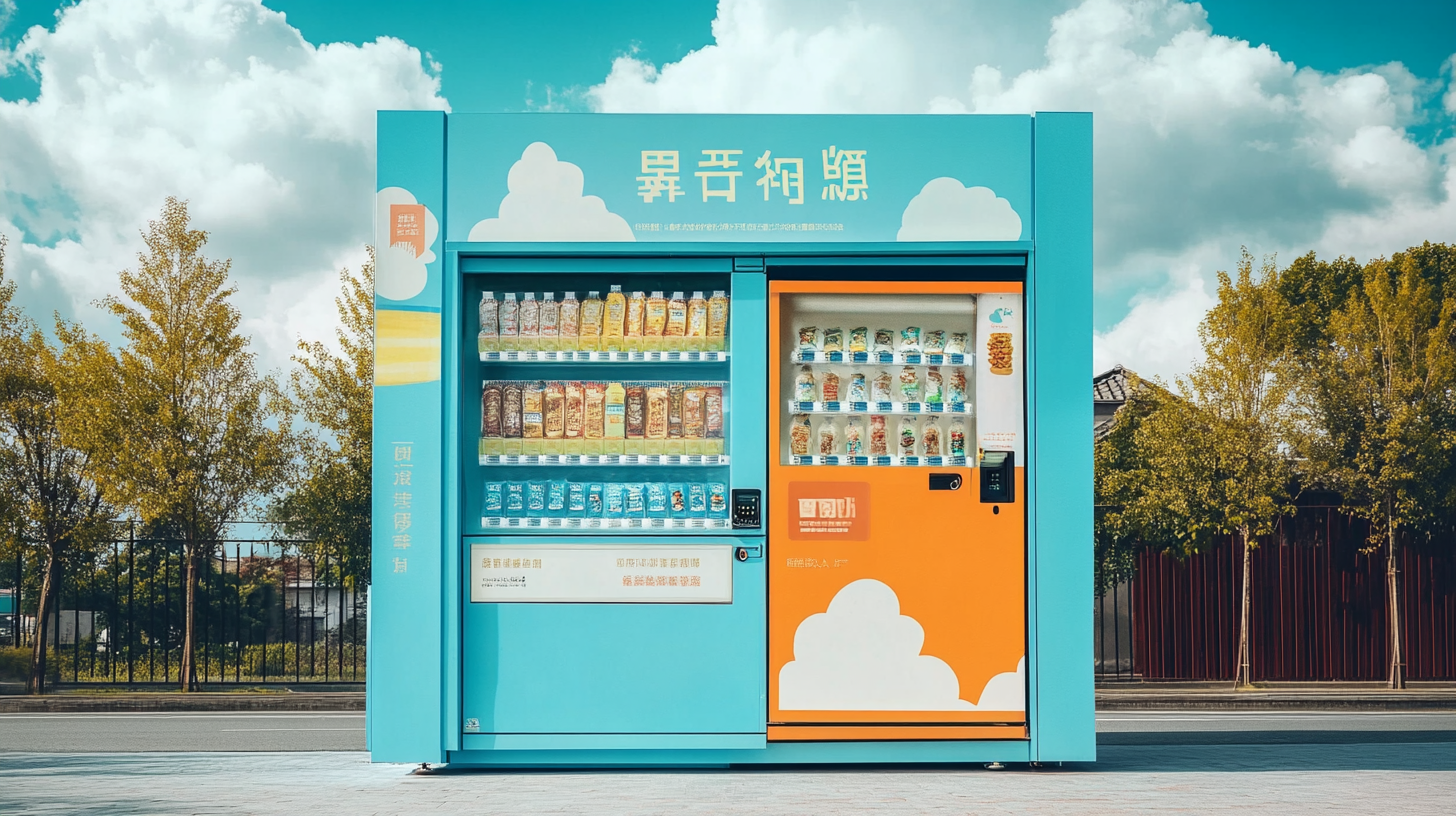Unlocking Success: How to Identify Top Suppliers in the Global Food Vending Industry
In the ever-evolving landscape of the food vending business, success hinges on the ability to identify and collaborate with top suppliers. As the demand for convenient and high-quality food options continues to rise globally, vending operators must navigate a complex marketplace filled with a myriad of suppliers. Understanding how to effectively assess and select the right partners not only streamlines operations but also enhances product offerings, ultimately leading to increased customer satisfaction and profitability.
Unlocking the key to supplier success within the food vending business necessitates a strategic approach. From evaluating product quality to analyzing supply chain reliability, knowing the essential criteria for selection is critical. This blog will explore the steps necessary for vendors to identify and engage with premier suppliers, ensuring they remain competitive in a saturated marketplace. Through insights and proven strategies, readers will gain the tools needed to build fruitful supplier relationships that can drive their business forward.

Understanding the Global Food Vending Landscape: Key Trends and Challenges
The global food vending industry is undergoing significant transformations driven by evolving consumer preferences and technological advancements. One of the key trends shaping this landscape is the growing demand for healthier and more diverse food options. As consumers become increasingly health-conscious, they are seeking out nutritious snacks and meal alternatives in vending machines. This shift is prompting suppliers to innovate their product offerings, incorporating fresh fruits, organic items, and even plant-based options to cater to a wider audience. Another important trend is the integration of technology into the vending experience. Contactless payments, smart vending machines equipped with touch screens, and inventory management systems powered by artificial intelligence are revolutionizing how consumers interact with food vending services. Suppliers are now focusing on enhancing user convenience and operational efficiency while also providing real-time data analytics to optimize stock levels and minimize waste. However, with these opportunities come significant challenges. Supply chain disruptions, particularly in the wake of global events such as the pandemic, have presented hurdles for suppliers in maintaining consistent inventory and pricing. Moreover, navigating regulations surrounding food safety and labeling is critical, as non-compliance can lead to significant setbacks for businesses. Understanding these trends and challenges is essential for stakeholders aiming to identify top suppliers capable of thriving in this dynamic environment.

Criteria for Evaluating Potential Suppliers in the Food Vending Sector
In the competitive landscape of the global food vending industry, successful supplier selection is crucial for maintaining quality and efficiency. A well-defined process for evaluating potential suppliers can significantly impact operational success. Key criteria recommended for assessing suppliers include their ability to meet food safety standards, reliability in delivery, and overall cost-effectiveness. It is essential for businesses to prioritize these factors, as they directly influence consumer satisfaction and brand reputation.
Moreover, the ability to manage risks associated with suppliers cannot be overlooked. Implementing a robust supplier qualification system ensures that companies not only select vendors who meet their immediate needs but also contribute to long-term sustainability. Factors such as the supplier's past performance, financial stability, and adherence to ethical practices are critical components of this evaluation process.
As the market evolves, incorporating advanced decision-making models can enhance supplier selection strategies. Methods such as the Analytic Hierarchy Process (AHP) and the Technique for Order of Preference by Similarity to Ideal Solution (TOPSIS) provide structured frameworks for comparing suppliers against multiple criteria. By leveraging these tools, businesses in the food vending sector can make informed decisions that foster reliable partnerships and result in shared growth and success.

Building Strong Relationships: Communication and Trust with Suppliers
In the global food vending industry, fostering strong relationships with suppliers is paramount for ensuring resilience and success. Effective communication and trust are the cornerstones of these relationships, enabling companies to collaboratively navigate the complexities of supply chains. According to recent industry surveys, over 70% of business executives identified trust as a critical factor in their partnerships with suppliers. This highlights the necessity of establishing transparent lines of communication that facilitate clear expectations and mutual understanding.
Building trust requires ongoing efforts to engage suppliers as true partners. Research indicates that companies that prioritize transparency not only enhance supplier relationships but also strengthen their overall supply chain. For example, brands that actively share information about production capabilities and potential challenges tend to cultivate higher levels of trust and cooperation, yielding significant long-term benefits. This collaborative spirit can ultimately lead to better product quality, innovation, and responsiveness to changing market demands.
Furthermore, embracing a proactive approach to communication can help mitigate misunderstandings that might arise. Industry data points show that organizations that maintain open dialogues with their suppliers experience up to 30% fewer disruptions in their supply chains. These statistics underscore the importance of investing in relationship-building strategies that promote clarity, confidence, and commitment. By emphasizing communication and trust, food vending companies can unlock significant value, creating a foundation for sustained growth and operational excellence in an ever-evolving marketplace.

Leveraging Technology for Supplier Identification and Management
In the rapidly evolving global food vending industry, leveraging technology for supplier identification and management has become a crucial factor for success. According to a recent report by Mordor Intelligence, the global vending machine market is projected to reach $30 billion by 2026, with a significant portion driven by innovative technologies that streamline operations and improve customer satisfaction. Through advanced data analytics and artificial intelligence, businesses can gain valuable insights about potential suppliers, enabling them to make informed decisions.
Utilizing platforms that feature supplier ratings, reviews, and performance histories can dramatically simplify the supplier selection process. A study by the Institute for Supply Management highlights that 71% of organizations see improved supplier relationships through technology, which ultimately leads to enhanced efficiency and reduced costs. For example, digital procurement tools allow businesses to analyze supplier performance in real-time, ensuring that they are working with the best partners who meet their specific quality and compliance standards in the competitive food vending arena.
Moreover, the rise of blockchain technology is also transforming the landscape of supplier management. According to Gartner, by 2025, 30% of supply chain transactions will be secured by blockchain technology. This innovation not only enhances transparency but also helps in tracking the provenance of food products. Consequently, companies can mitigate risks related to food safety and compliance by ensuring that they partner with suppliers who uphold high standards of quality.
In summary, incorporating technological advancements in supplier identification and management is essential for businesses in the food vending industry. With data-driven insights and cutting-edge tools, companies can refine their supplier networks, ultimately leading to improved operational efficiencies and greater market competitiveness.
Mitigating Risks: Ensuring Quality and Compliance in Food Vending Supply Chains
In the highly competitive global food vending industry, ensuring quality and compliance within supply chains is paramount. The varying regulations across countries present unique challenges for vending operators looking to source food products. Each supplier must adhere to local health and safety standards while also conforming to international guidelines. This multifaceted regulatory environment underscores the importance of conducting thorough due diligence when identifying potential suppliers.
To mitigate risks, businesses should implement a robust supplier assessment framework. This includes evaluating suppliers’ certifications, safety records, and compliance histories. Regular audits can be instrumental in maintaining oversight, allowing companies to verify that suppliers consistently meet quality standards. Additionally, fostering open communication with suppliers can help address potential issues before they escalate, creating a proactive approach to risk management.
Leveraging technology can also enhance compliance monitoring in food vending supply chains. Innovations such as blockchain can provide transparency, tracing products back to their origins and ensuring they meet the necessary safety standards. By utilizing these tools, operators can build stronger relationships with suppliers who prioritize quality and compliance, ultimately fostering a more reliable and successful vending operation.

